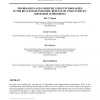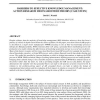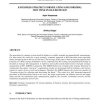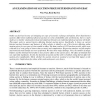110
click to vote
ECIS
2001
15 years 4 months ago
2001
Recent work on organisational knowledge suggests that, in addition to cultivating the 'knowledge spiral', organisations need to focus on facilitating forms of 'know...
105
click to vote
ECIS
2001
15 years 4 months ago
2001
The paper deals with the development of the informational since the IFIP '71 Congress in Ljubljana when the new consciousness evolved to the necessity of nowadays information...
131
click to vote
ECIS
2001
15 years 4 months ago
2001
The paper considers the conditions governing the diffusion and development of e-commerce. The analysis builds on earlier discussions of technological successions and explores a nu...
ECIS
2001
15 years 4 months ago
2001
The Internet and Intranet reduce much of the costs of information sharing, but they do not solve receivers' reading and interpretation limitations. Alternatively, browsers an...
ECIS
2001
15 years 4 months ago
2001
We have been studying the growing use of information and communication technologies (ICT) in the residential real estate industry and the effects of this use on how realtors work....
111
click to vote
ECIS
2001
15 years 4 months ago
2001
We are not only in a new millennium but also a new era. A variety of terms such as the Post-Industrial Era (Huber, 1990), the Information Age (Shapiro et al, 1999), the Third Wave...
134
click to vote
ECIS
2001
15 years 4 months ago
2001
Despite evidence that the majority of knowledge management (KM) initiatives miscarry, there has been a paucity of critical, in-depth research into the causes of failure. In this p...
ECIS
2001
15 years 4 months ago
2001
The motivation for strategic action should be highest in volatile, unstable and unpredictable environments. For that reason, the search for a more strategic, systematic approach t...
147
click to vote
ECIS
2001
15 years 4 months ago
2001
Online auction has become an intriguing new type of economic exchange mechanism. Given that Internet auctions differ from traditional physical auctions in terms of flexibility and...
127
click to vote
ECIS
2001
15 years 4 months ago
2001
Interpreting the outcome of a recent survey on Internet banking in Europe, [CARIGNANI et al., 2000], we point the attention to the adoption of Web technologies in Italian retail b...




